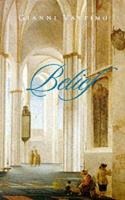In this engaging book, Gianni Vattimo explores the theme of faith and religion which underlies much of his work. Written in a personal, conversational style, Vattimo examines such concepts as charity, truth, dogmatism, morality and sin through the lens of his own life and his own return to Christianity. While deeply critical of institutionalized religion and the Church, Vattimo discovers in the Christian tradition a voice (not a distinct message) whose interpretation is still being played out around us.
At the centre of the book is the enigma of belief. Freed by modernity from its Platonic subordination to knowledge, belief is recovered as a crucial and inevitable feature of our cultural and personal lives. 'Do you believe?' Vattimo is asked. 'I believe so', he replies.
Through an analysis of his own responses to the work of Nietzsche and Heidegger, Vattimo explores the relationship between nihilism and his own life as a devout Catholic, leading him to conclude that secularization stems from a Christian impulse, and that nihilism too could only have emerged from a Christian culture.
This original contribution to the contemporary debate on religion will be of great interest to scholars and students of theology, religious studies and philosophy.

